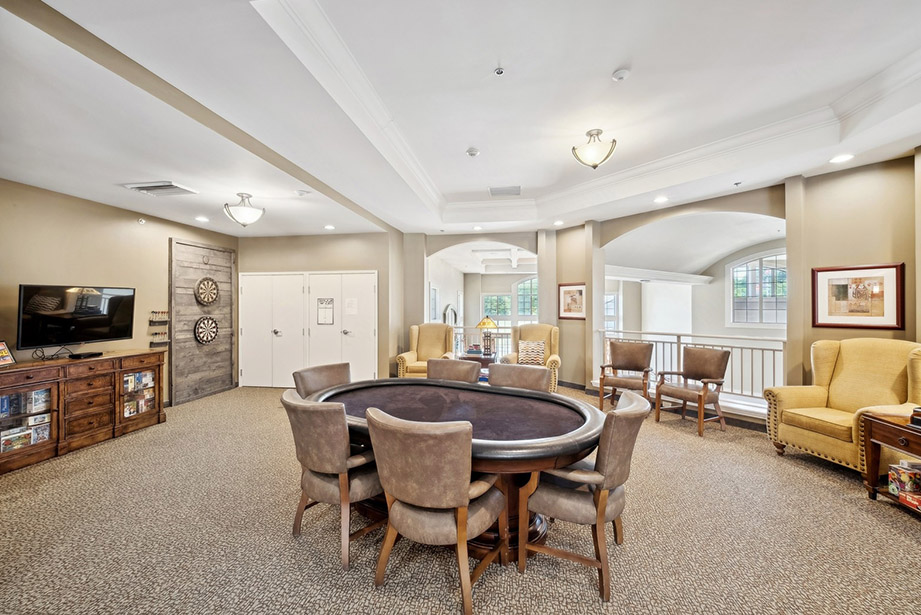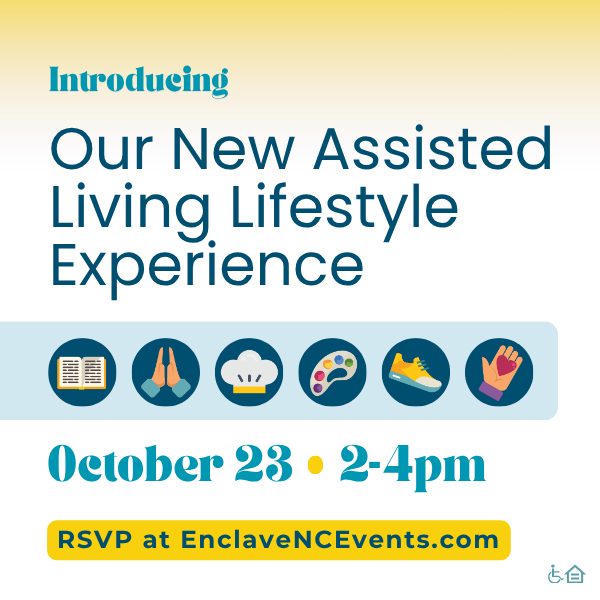Alzheimer’s disease is a debilitating condition that affects more than 6 million Americans. It is a neurological condition that gradually erodes memory and cognitive abilities, making even the most basic tasks seem insurmountable. Typically, these symptoms start to manifest later in life for most individuals diagnosed with Alzheimer’s.
While the gradual loss of cognitive function is most well recognized, other symptoms often come as a surprise, especially hallucinations.
It’s quite common for people with Alzheimer’s and other forms of dementia to experience hallucinations. These hallucinations can occur at any stage of the disease, but they tend to become more common as it progresses.
Hallucinations can be troubling for both the patient and their caregivers. And hallucinations are not just limited to visual experiences; auditory hallucinations are also common. People with Alzheimer’s may have false perceptions or ideas that seem very real to them.
Memory care at The Enclave of Newell Creek can offer a secure environment, stimulate cognitive function, ensure proper nutrition, and provide relief to caregivers–all of which significantly contribute to managing Alzheimer’s disease.
What Are Hallucinations & What Causes Them?
Hallucinations are sensory perceptions that do not exist in reality. They can be auditory or visual or involve taste, smell, or tactile sensations that seem to feel real. This can cause significant distress to the person experiencing them.
Hallucinations are a common symptom of many conditions, such as schizophrenia and Parkinson’s disease, and can be caused by certain medications, alcohol, and drugs. Lack of sleep, a high fever, and medical conditions such as epilepsy can also cause hallucinations.
The exact reason why hallucinations occur is still unknown, but researchers suggest that it has to do with a mix of biochemical imbalances in the brain and external stimuli.
Why Alzheimer’s Can Cause Hallucinations
Hallucinations can occur in Alzheimer’s patients but are more often attributed to a different form of dementia called Lewy body dementia (LBD).
LBD is a type of dementia that shares many of the same symptoms as Alzheimer’s, but is more likely to involve hallucinations and changes in movement capability. According to the Lewy Body Dementia Association, LBD is the second most common type of dementia after Alzheimer’s.
Researchers suggest that the root cause of hallucinations in Alzheimer’s is due to progressive nerve damage in certain areas of the brain. As the disease advances, the damaged nerves can become overactive and produce hallucinations.
Types of Hallucinations
Auditory Hallucinations
Auditory hallucinations involve sound or voice. One may hear an individual speaking or giving instructions to carry out various tasks. The voice heard could exhibit a range of emotions–—t might be angry, neutral, or even warm.
This form of hallucination can also involve hearing nonexistent sounds such as footsteps in an attic or persistent noises like clicking or tapping.
Visual Hallucinations
Visual hallucinations pertain to the experience of seeing non-existent entities. These could encompass objects, visual patterns, individuals, or lights.
For instance, one might perceive a person who is not present in the room or witness flashing lights that are invisible to others.
Olfactory Hallucinations
Olfactory hallucinations are related to the sense of smell. A person may experience an unpleasant odor, and find it upsetting that there is no clear source and other people in the room appear to ignore it.
But sometimes, these hallucinations can bring about pleasant scents too, like the sweet smell of flowers or the oceanside.
Gustatory Hallucinations
Gustatory hallucinations are akin to olfactory hallucinations, but they differ in that they affect the sense of taste rather than smell.
These hallucinations often induce unusual or unpleasant tastes. A relatively common symptom among individuals with epilepsy is gustatory hallucinations which manifest as a metallic taste.
Tactile Hallucinations
Tactile hallucinations pertain to sensations of touch or movement in your body. A person could experience sensations akin to insects crawling on their skin, perceive internal organs moving, or even feel an imaginary touch from another’s hand.
Treatment Options & Coping Techniques
While there is no cure for Alzheimer’s disease, various treatment options and coping techniques can help manage the symptoms, including hallucinations.
Medications can be prescribed to relieve hallucinations, and therapies such as cognitive-behavioral therapy can help control visual hallucinations.
Coping techniques, such as creating a calm environment and providing a consistently reassuring presence, can also be effective.
Approaching hallucinations as an issue caused by the disease instead of an individual’s personal struggle can also help families and caregivers understand and manage the condition better.

Navigating Hallucinations
Hallucinations are a common symptom of Alzheimer’s disease, and they often occur due to progressive nerve damage in certain areas of the brain.
Family members and caregivers can significantly impact the management of hallucinations by accepting and understanding them as symptoms of Alzheimer’s and learning ways to help alleviate the condition’s burden.
Lilac Trace Memory Care at The Enclave of Newell Creek provides a stable, calm environment that can be helpful in managing Alzheimer’s. Our caregivers undergo specialized training to provide expert care and extraordinary empathy and offer specifically designed care plans to meet the unique needs of individuals with dementia. Call us today to schedule a visit and learn more about our memory care program.









